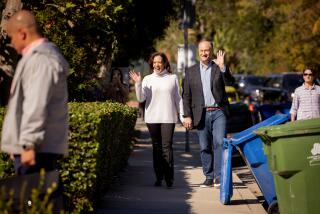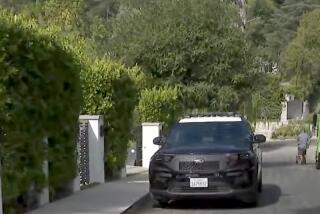Law Enforcement in Fallbrook Travels Long and Winding Road
- Share via
When their Neighborhood Watch group meets Monday night in Fallbrook, the people who live along Georgine Road, Del Valle Drive and Tumbleweed Lane may concede that all the cops in the world probably couldn’t have prevented neighbor Ken Loehr’s killing two weeks ago, or kept his tree-shrouded home from being burglarized.
But Loehr’s death, just a week before his 89th birthday, has caused his neighbors and others in Fallbrook to realize how little law enforcement they do have.
Now people such as Jeff Baker are succumbing to a new sense of vulnerability that comes with living in the country.
2 Deputies on Patrol
Some are realizing that only two sheriff’s deputies at any one time usually patrol the 130-square-mile region from just east of Interstate 15--along the ridgeline of Rainbow Heights--west to Camp Pendleton, and north of California 76 from Bonsall to the Riverside County and Orange County lines.
Depending on where they are, it might take sheriff’s deputies 15 minutes or longer--maneuvering along narrow, winding roads where they can’t safely exceed the speed limit--to get to an emergency. The response time is even longer at night, given roads with poor or no lighting; barely visible, home-made street signs, and sometimes poorly marked houses at the end of long driveways, hidden behind a screen of avocado or orange trees.
The lack of omnipresent law enforcement is a concession to a rural life style that many people knowingly make. But, for others, it’s a reality that didn’t strike home until Loehr’s death Aug. 12.
“Police response time was something I just didn’t worry about--until now,” said Baker, who moved to Georgine Road from an Oceanside housing tract three years ago, to escape neighbors breathing down on him from all sides. “It’s something you don’t worry about until it’s too late.”
So now Baker is buying a fence for his property. He bought a Doberman pinscher puppy that he’ll train as a watchdog. He said he will no longer keep his windows and doors open when he drives into town. And he promises to use a house sitter whenever he and his family leave home overnight or longer.
Indeed, the good life in the country has been skewed by the apparently random slaying of an old man, left dead of asphyxiation on his kitchen floor.
Prime Suspect
(Jorge Herrera Vargas, 38, described by homicide investigators as an unemployed laborer who lives in the Bonsall area, was arrested two days later. He is being held on $100,000 bail in San Diego County Jail on suspicion of stealing Loehr’s pickup truck and possessing stolen property. He has not been charged in the homicide, but Sheriff’s Lt. Bill Baxter described him as the prime suspect.)
“A murder is something you don’t ever think about happening in your neighborhood,” said Marci Carle, a captain of her Neighborhood Watch group. “Most people go an entire lifetime without having something as gruesome as this happen in their neighborhood, to someone they know.
“How much more conscientious could we have been?” Carle said of her Neighborhood Watch group, one of about 170 that have sprung up around Fallbrook in recent years. Indeed, it was a neighbor who found Loehr’s body after Loehr failed in his daily ritual of opening his garage door, a signal to a neighbor that he was all right.
Crime statistics are relative from one community to the next, but Loehr’s killing has brought home to Fallbrook the reality that it is not immune to serious, violent crime. Authorities say Fallbrook historically has had more than its share of burglaries and auto thefts, but has been relatively unscathed by violent crime against people.
Fallbrook was particularly hard-hit by a rash of so-called power-off burglaries last year, when burglars broke into about 80 homes after cutting off the power--a series of burglaries that has since stopped and for which, deputies say, a suspect has been identified, but not yet apprehended.
Loehr’s killing was the second in Fallbrook this year--a migrant worker was killed by another Mexican national earlier in the year. In July in Fallbrook, there were no killings, no rapes, three robberies and 11 assaults--but 45 larcenies, 27 auto thefts and 35 burglaries. Among the burglaries, six times the burglar gave up after being unable to break in, 16 times the burglar forced entry into the house and 13 times the burglar simply walked or climbed through an open door or window.
“We’re not Mayberry, but we’re not as bad as Vista, either,” said Deputy Rocky Laws, a former Marine Corps helicopter pilot who said jokingly that he joined the Fallbrook patrol duty because “I’ve used up all my courage in the Marine Corps and I’ve had my fill of adventure elsewhere.”
Laws and others say Fallbrook’s residents are a mixture of old-timers who have learned to take care of themselves and recent newcomers from Los Angeles and Orange counties who were spoiled by the greater presence--and quicker response time--of police in their old neighborhoods, and are now having to adjust.
Indeed, many of Fallbrook’s more established residents are hardly naive about the possibility of crime, and seem to have acclimated themselves to Fallbrook’s level of law enforcement.
“Nobody’s been safe since they burgled the Bank of England,” quipped Sgt. John Reeve, a supervisor in the sheriff’s Fallbrook substation. “Some people up here are probably armed to the gills, and maybe for good reason.”
Another deputy, Leo Rodrigues, figures 30% of Fallbrook’s homes have private security systems. But, he adds: “You can put up all the security signs you want--burglars still know what our response time is.”
Said Deputy Gary Scott: “It’s easier to deal with the old-timers. They know better than to expect to see a patrol car three minutes after they call us. The new residents are annoyed that it takes us 30 to 40 minutes to get to them.”
Remote Roadway
There are 200 miles or more of roadway in the Fallbrook beat--some so remote, along the northern fringe in the remote De Luz Canyon, that they only show up on maps provided to the deputies by the federal Bureau of Land Management.
Scott concedes that in the four years he has worked the Fallbrook beat, there are still areas he hasn’t driven “and there are houses I have no idea how to get to.”
“Some streets change their names just because of a little bend in the road,” Scott said. “And usually there’s only one way to get from one location to another, unlike the city, where you’ve got three or four ways of getting somewhere.”
Deputy Ed Puett added: “Sometimes people give you directions to their house by saying, ‘Go 2 1/2 miles, and turn left at the dead oak tree if it’s still there.’ ”
On a recent patrol, one deputy tried to find a shortcut between two neighborhoods and ended up on a rutted dirt path, nosing his Ford LTD cruiser through the middle of an avocado grove, before he found his way out at the other side, momentarily confused by where he ended up.
Given the handicap to law enforcement, authorities say neighbors need to rely on one another more.
That’s one of the goals at Monday night’s Neighborhood Watch meeting, Carle said.
The last such meeting, she said, was last September; while neighbors have tended to watch out for one another over the past 12 months, there hadn’t been another Neighborhood Watch meeting even planned until Loehr’s death, she said.
“We thought we’ve been pretty conscientious,” she said, “but the homicide detectives told us that we need to get together again, to reemphasize how we need each other.”
Life Style Questioned
She said some neighbors have wondered aloud if they’re cut out for country living and the relative dearth of law enforcement.
But Carle said she’s not packing her bags. When she lived near Long Beach, she said, her home was burgled three times in fewer than 10 years.
“There’s no escaping it,” she said.
“When Mr. Loehr was killed, I felt violated. You think to yourself, ‘Why him, and not us?’ You feel very insecure. You’re angry that you have to live in that kind of fear. Then you’re saddened it happened, and then frustrated because you don’t know what to do about it. Finally, you try to put it all in perspective and say, ‘OK, what can we as a neighborhood and as individuals do to make sure this isn’t such a vulnerable place?’
“A lot of people are wondering, what are we doing, living out here? But this could happen anywhere. The good of living here still outweighs the bad,” she said.
More to Read
Sign up for Essential California
The most important California stories and recommendations in your inbox every morning.
You may occasionally receive promotional content from the Los Angeles Times.













